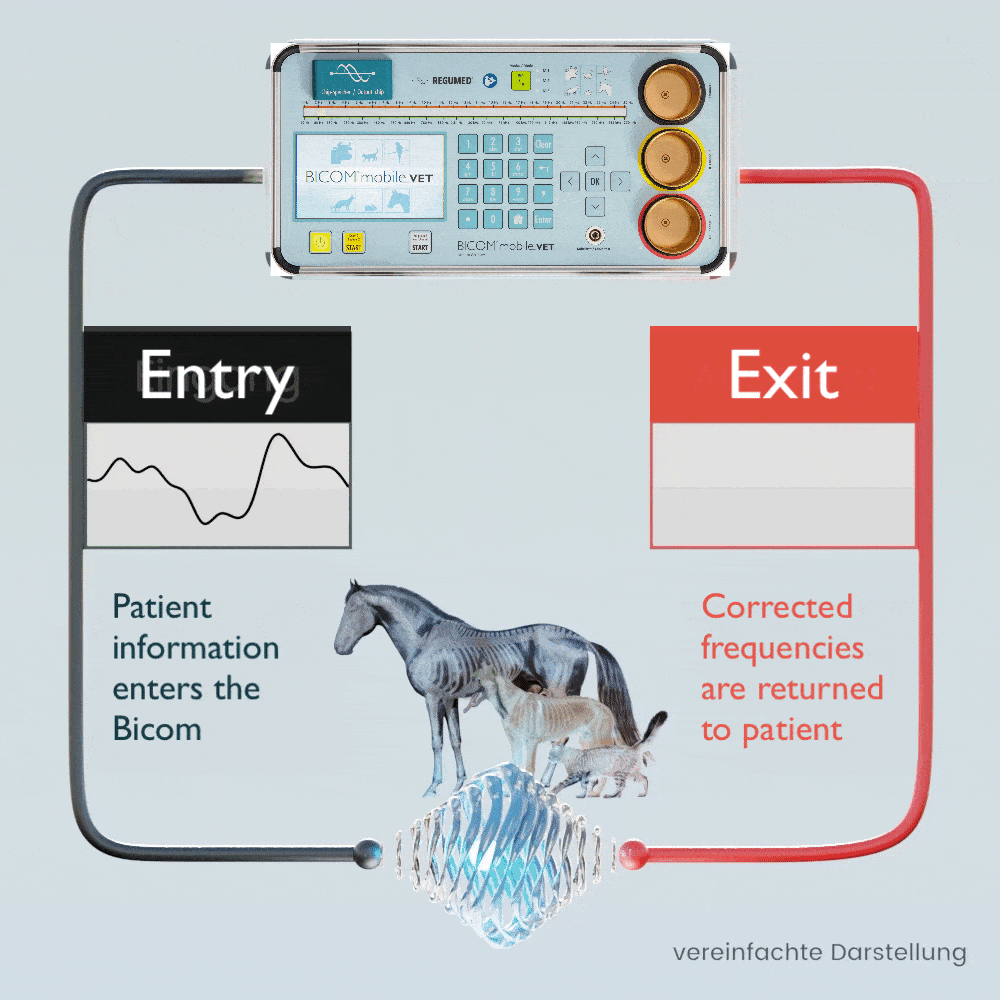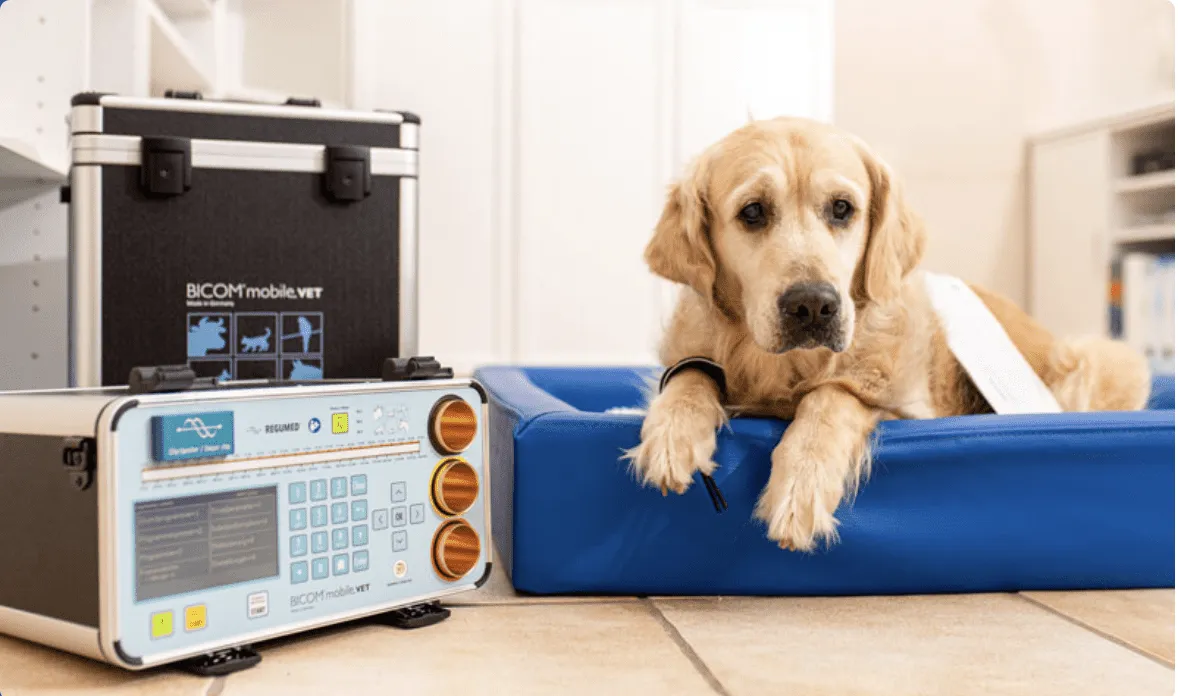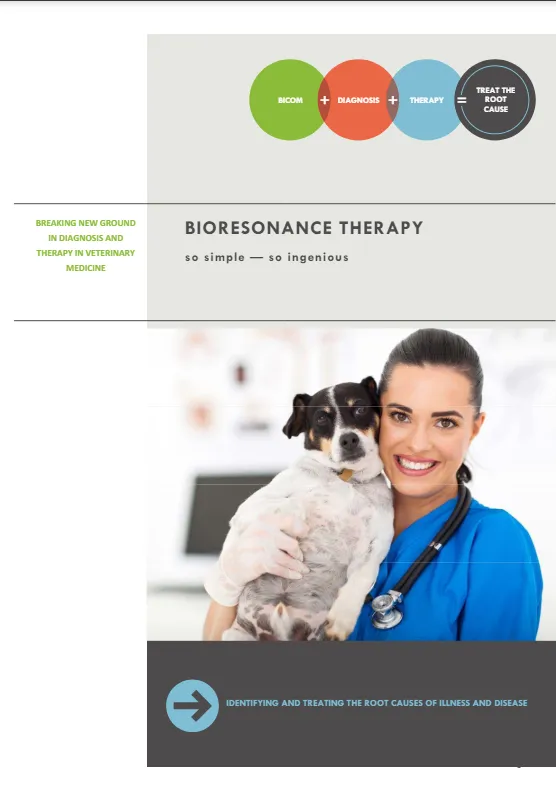Treatment with the help of the patient’s own information
in the BICOM® mobile VET bioresonance device
In contrast to other “frequency therapy devices”, BICOM® bioresonance is a method that is highly individual and perfectly tailored to the needs of the patient through the use of the patient’s own information and the possibility of testing specific wave patterns for resonance.
The patient’s own pathological and physiological information is recorded using special applicators and fed into the BICOM® mobile VET.
Depending on the therapy program, the specific wave pattern as a carrier of information is amplified, weakened or inverted and transmitted back to the patient in modulated form, which means that the transmission of information changes in clarity depending on the modulation or it disappears completely.
The treatment signals continuously adapt to the changing pathological situation of the patient. As the therapy progresses, the body’s ability to regulate is reactivated.
Find out more about this topic at our regular events. Together with veterinarians and animal naturopaths, we offer various face-to-face and online events .
The BICOM® bioresonance method is a cause-oriented, holistic treatment concept. It can narrow down the cause of the health problem in animals and find out even the hidden causes of the clinical picture.
Animals have a natural regulatory system that can also compensate for unusual influences. However, even good self-healing powers eventually reach their limits. Persistent exposure to allergens, environmental toxins, fungi, viruses, bacteria or stress and changed living conditions weaken the immune system and are often the cause of an illness. In particular, fungal infestation on the skin or chronic diseases in general are not always due to a breeding-related genetic defect, but are signs of a disturbed immune system.
The BICOM® bioresonance method is the key to successful diagnosis and therapy, especially for animals that cannot tell us exactly where it hurts or what the symptoms are. It is a gentle form of therapy that can be carried out without side effects and without additional stress for the animal.
The BICOM® mobile VET records the bioenergetic state of the animal, processes the information it contains and returns modified vibrations / therapy frequency patterns to the animal. Symptoms and stress can be diagnosed and targeted therapy can be initiated.
Through the use of endogenous and exogenous substances, the body’s own self-healing powers can be activated and imbalances that have existed for a long time can also be regulated.
REGUMED Medizintechnik are pioneers of the BICOM® bioresonance method. More than 30,000 therapists worldwide, well over 10,000 of them in Germany, successfully use their therapy concept.

Biophysical basics of the bioresonance method
Life is only possible when three conditions are met: matter, energy and information.
We also find these aspects in conventional medicine, both in diagnostics and in therapy. For example, every drug is also a carrier of information.
Information is neither energy nor matter, it is immaterial and comparable to the meaning of a message from a sending to a receiving system.
In addition to the electrical processes in the receptor proteins and biomembranes in general, electromagnetic interactions through light (biophotons) also play a role in cell communication and the transmission of information.
Specific electromagnetic wave patterns act as information carriers. These wave patterns can be modulated by the BICOM® device in order to eliminate disturbing or stressful information in an organism.
The goal is to restore the free flow of healing information (cell communication) and thus support the self-regulation of the organism and the self-healing powers.
Individual, patient-specific information or information from native substances, digitized substances or information stored on storage media can be used for therapy.
What your colleagues are saying…

Multiple Illnesses, Multiple Drugs And Your Health
A recent study by Medicare Choices reports that more than 50% of Medicare beneficiaries have been diagnosed with two or more chronic illnesses. They also report that as much as 83% of beneficiaries over the age of 85 have also been diagnosed with more than one chronic condition. Centers for Disease Control and Prevention reports that approximately 25% of the average American population has been diagnosed with multiple chronic conditions and that up to 71% of the total health care spending in country accounts for patients diagnosed with multiple chronic conditions.
Multiple Prescription Drugs
In the United States alone, there was more than 4 billion prescription drugs dispensed to patients during the year 2015. WebMD reports findings of the top 10 most prescribed drugs in the United States during the period April 2014 through March 2015 to include Synthroid, Crestor, Ventolin, Nexium, Advair Diskus, Lantus Solostar, Vyvanse, Lyrica, Spiriva Handihaler and Januvia. Centers for Disease Control and Prevention reports the following findings on prescription drugs:
8% of patients are prescribed more than two prescription drugs in a period of one month
7% of patients are prescribed more than four prescription drugs in a period of one month
These findings provide clear evidence that the majority of American citizens who are on prescription drugs are using more than one single drug at any given time. With this fact in mind, it is important to swift our focus towards both the effects and side-effects of prescription drugs. Research is usually performed on a specific drug, which means medical experts look at the effects of a single drug on a patient. These studies provide them with data relating to the effectiveness of the drug, as well as help them understand any side-effects that the drugs might cause.
Little research is ever conducted on the use of a combination of prescription drugs at the same time. This is a cause for concern when considering the figures shared above concerning the use of multiple prescription drugs at the same time during a 30-day period. When two or more drugs are prescribed to a patient in one prescription, the different chemical compounds found within these drugs often leads to interactions with each other, which can worsen side-effects and even harm the body itself.
Dangers of Prescription Drugs
Daily Mail recently reported that prescription drugs are the third most common cause of death in Britain. They report that several cases where prescription drugs provided to treat symptoms of insomnia and anxiety have actually led to the death of a patient. The major cause of death was side-effects experienced from the prescribed medication. Their report claims that psychiatric prescription drugs are considered the third biggest killer in the United Kingdoms and it closely follows the death-toll of cancer and heart disease. Harvard Center for Ethics also report that the European Commission estimates the amount of deaths caused by side-effects from prescription drugs to be around 200,000 each year. Furthermore, it is estimated that around 128,000 people in the United States die from reactions to these drugs each year.
The U.S. Food and Drug Administration reports that drugs can react with each other and cause unexpected side effects. One such example is when a sedative and antihistamine is taken together. This causes reactions to slow down and can make simple tasks such as driving potentially dangerous. BeMedWise reports that taking a prescription drug that contains aspirin and a blood-thinner together can potential lead to excessive bleeding. They also report that certain types of antacids may block other prescription drugs such as antibiotics and heart medication from being absorbed into the patient’s blood stream which makes the drug ineffective. Some reported potentially deadly interactions can lead to:
A rapid drop in blood pressure
Irregular and fast-paced heart beat
Damage to the heart and liver due to toxin buildup
Dr. Mercola reports that on average, 10% of elderly people over the age of 65 takes 10 or more prescription drugs on a regular basis. He further reports that Wayne K. Anderson at the State University of New York at Buffalo mentioned the chance of a drug-drug interaction when taking eight or more drugs at a time is 100%. He also mentioned that the chance of a drug-drug interaction when taking six or more drugs at a time is 80%. While it is relatively easy to determine side-effects that may occur when two prescription drugs are taken at the same time, it becomes much more difficult to consider these side-effects when a third, fourth or even a tenth prescription drug is added to the list. The doctor describes that when three prescription drugs are taken together, a total of seven tests need to be performed to identify potential side-effects. When five drugs are taken together, a total of 121 tests need to be performed to identify potential side-effects. As the number of drugs taken increases, so does the number of tests. This eventually leads to impossible cases where side-effects will occur, but testing for them tend to be nearly impossible.
Conclusion
Complementary therapists are sometimes called quacks because their methods may have been used for thousands of years without harm but not scientifically tested, however doctors that prescribe multiple drugs cannot show that these combinations have been tested scientifically, so who are the real quacks? With billions of prescriptions being filled every year and thousands of people using more than a single prescription drug at the same time, the time for concerning about the interactions between drugs have never been as important as now. Thousands of deaths are recorded every year due to side-effects of drugs and this has lead medical experts to announce prescription drugs as the third most common cause of death on the planet. While medication is vital for treatment of certain conditions, it is also important to consider potential side-effects when using a combination of drugs.
Treatment Priorities
For gentle and optimal treatment of the causes of diseases in animals
The BICOM® bioresonance method is predestined for use with large and farm animals such as horses , but also with dogs , cats and small animals. The treatment focus of the BICOM® mobile VET is wide-ranging. It is now used for many indications.
It recognises health deficits at an early stage and is used, among other things, for the following symptoms:
sweet itch
Feed intolerances
allergies and related diseases
COB/COPD
leishmaniasis
Lyme disease
anaplasmosis
lameness in horses
hoof ulcer
Poisoning by poisoned baits, plants etc.
mauke
Feline infectious peritonitis (FIP)
Cat flu/cat disease
eye/conjunctivitis
and much more
Get advice now!
Our experts are happy to be there for you personally
Our BICOM® bioresonance experts are available to answer any questions you may have
and will be happy to advise you personally and individually.




Request more information
Quick Links





Facebook
Instagram
Mail